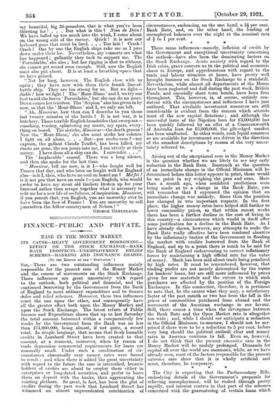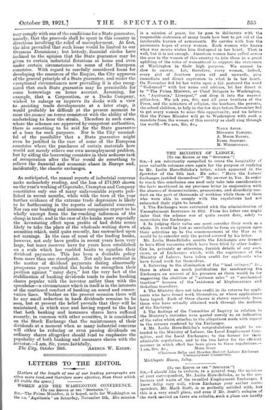FINANCE—PUBLIC AND PRIVATE. EASE IN THE MONEY MARKET.
ITS- CAUSE—HEAVY GOVERNMENT BORROWING— EFFECT. ON THE STOCK EXCHANGE—HANK RATE PROSPECTS—UNEMPLOYMENT RELIEF SCHEMES—BANKING AND INSURANCE SHARES.
[To THE EDITOR OF THE " SPECTATOR:1
Ste„--There are two outstanding influences mainly responsible for the present ease of the. Money Market and the course of movements on the Stook Exchange. Those influences are great uncertainty with regard to. the outlook, both political and financial, and the continued borrowing by the. Government from the Bank of. England to meet ordinary expenditure and to finance doles and relief schemes. Moreover, these two. influences react the one' upon the other, and consequently have all the greater effect both upon the- Money Market and upon the Stock. Exchange. The latest return of Public Income and Expenditure shows that up to last Saturday the total amount borrowed within a comparatively few weeks by the Government from the Bank was no less than £74,000,000, being almost, if not quite, a record total. In simple language, that means that fresh; loanable credits in Lombard Street have been created to that amount, at a moment, moreover, when- by reason of trade depression' commercial requirements for loans are unusually small. Under such. a combination of cir- cumstances abnormally easy money rates were bound to result ; and when there is added the great uncertainty with regard to the future the ease is intensified, because holders. of credits are afraid to employ them either in enterprises or long-dated securities, and prefer to leave them on deposit with the bank; thus aggravating the existing plethora. So great, in fact, has been the glut of credits during the past week that Lombard Street has witnessed- an almost unprecedented combination of circumstances, embracing, on the one- hand; a 5i.per cent. Bank Rate; and, on the other hand, the lending of unemployed balances- over the night at the nominal rate of to 1 per cent. * * * These same- influences—namely, inflation of credit by the Government and exceptional uncertainty concerning the outlook—have also. been. the dominating factors on the Stock Exchange. Acute anxiety with regard to- the Irish crisis, grave concern as tri the political and economic chaos in Europe, and apprehensions with regard- to the trade and labour situation at home, have pretty well brought business on the Stock Exchange to a standstill. Nevertheless,, while almost all departments of the- House have been neglected: and dull during.the past week, British Funds, and especially short term bonds,. have been firm- throughout. This, however, is, of course, entirely con- sistent with the circumstances and influences I have just outlined. That available investment resources- are, still considerable is evident from the success which attends most of the new capital flotations ; and: although. the successful issue of the Nigerian. loan for £3;000„000 has been quickly followed by an: offer of a Commonwealth of Australia. loan for £5,000,000; the gilt-edged market has been unaffected.. In other words,, such liquid resources as are available for. investment are-driven in the- direction; of the soundest descriptions by reason of the very uncer- tainty referred to.
Arising out of. the exceptional ease in the Money Market is- the question whether we are likely to: see any early reduetion in the- Bank Rate. Inasmuch as the, question. of an immediate change: in the- Official Minimum will be determined before:this.letter appears in. prints- there would be no point in my weighing: the pros and eons,. More than a month ago,. when confident predictions were being made as to- a change in the Bank Rate,. you will remember that I expressed the opinion that an; immediate change was unlikely.. Since then. the- position; has changed in two important respects:. In the first. place, the higher money rates:have helped: still: further to' lower commodity prices, so that within: recent- weeks there has been a further decline: in. the cost of living: in. this country—a circumstance which would in itself offer. some justification for a decline in the. Bank. Rate: As I have already shown, however any attempts, to make. the: Bank Rate. really effective have. been rendered abortive by the inflationary tactics of the, Government in flooding the market with. credits borrowed from the Bank of England, and up to. a point there is much to be said for the Bank of England endeavouring to correct inflationary forces by maintaining- a high official- rate for the value of money. Much has been said about trade being penalized by high rates. It must be remembered, however, that trading- profits are not merely, determined by- the terms for bankers' loans, but- are still more. influenced. by prices. given for raw materials and* the extent to which such purchases are affected by the. position of- the Foreign Exchanges. In this connection, therefore, it is pertinent to note that, be the causes- what, they may, a satisfactory factor of the past month or two has been the fail' in the prices: of commodities purchased from abroad and- the movement- of the American exchange in our favour. Still, them comes a time when. the- divergence between the Bank Rate and: the Open Market rate, is altogether too wide ; and, while I should not anticipate a reduction in the Official Minimum to-m:orraw;. I. should not be. sur- prised if there were to be a reduction to 5 per cent. before. very long should- the political outlook: clear and money rates in America continue to fall. Even so,. however, I do not think that the present excessive ease- in the Money Market will- be unduly prolonged: Demands for capital all. over the world are enormous, while, as we have already seen, most of the factors responsible for the present extreme' ease show that it is wholly artificial and must, therefore, be temporary. * * The City is expecting that the Parliamentary Rills, embodying details of. the Government's proposals for relieving unemployment,. will be. rushed through pretty rapidly, and interest centres in that part of the- schemes concerned with the guaranteeing. of. ceztain loans. which may comply with one of the conditions for a State guarantee, namdly, that the proceeds Shall be spent in this country in directions involving theselie.1 of unemployment. At first, the idea prevailed that ouch loans would be limited. o our Overseas Dominions ; but latterly, financial :circles have- inclined to the opinion that the State guarantee may be given to ,certain industrial flotations at home and even under certain circumstances to some of the European countries. With regard to carefully considered loans for developing the -resources of the Empire, the -City approves of the general principle of a State guarantee, and under the exceptional circumstances now prevailing it is also recog- nized that such State guarantee may be permissible for some borrowings on home Account. Assuming, for example, that a Corporation, or a Docks Company, wiahed to enlarge or improve its docks with a view to Assisting -trade 'developments at a later ,stage, would probably be ..ffi emit at the present moment to -raise the money -on terms consistent with the ability of the -undertaking :to bear the strain. Therefore in such cases, where the schemes -are approved by-competent authorities, -there 'is something to be said for 'the State guarantee• of -a loan for such purposes. Nor is the City unmind- fril of the possibility that a State guarantee might even be justified in the case of some of the European .countries Where the purchases of certain materials here would not merely relieve our .own unemployment problem,' but by Aiding the borrowing.countries in their arduous task of .recuperation after the War ;would slo something to :relieve the financial :and economic .chaos in Europe and,. incidentally, the .chaotic exchanges.
As anticipated, the annual reports cif industrial concerns make melancholy reading, and the loss of £74,000 shown on-the-year's working of Copestake, Crampton and Company- constitutes only one of many unfavourable reports pub- lished in recent months, while with the turn of the year further evidence of the extreme trade depression is likely to be'forthcoming in the reports of industrial concerns.' Nor can our banking and insurance companies expeet to be Wholly exempt from the far-reaching influences of the -slump in trade, and in the case of the.banks more especially the devastating effect upon profits of bad debts seems likely to -take the place of the -wholesale -writing down of, securities which, until quite recently, has encroached upon net earnings. In -the case of most of the leading banks, however, not only have profits in recent years been very large, but -inner reserves have for years been established on a scale which has enabled banks to equalize their dividend payments. This has been a desirable policy from more than one-standpoint. Not only has restraint in the matter o'f dividend payments during abnormally prosperous years enabled the banks to strengthen their position against " rainy days," but the very fact of the stabilization of banking dividends tends to make banking shares popular with the investor rather than with the speculator—a circumstance which in itself is in the interests .of the continued conduct of banking on sound and conser- vative lines. Whether on the present occasion there will be any small reduction in bank dividends remains to be seen, -but at present the belief -prevails that they will be maintained, in which case and -having regard to the fact that both banking and insurance shares have suffered recently, in common with other securities, it is considered on the Stock 'Exchange that the maintenance of their dividends .at a moment when so many industrial concerns will either -be reducing -or even passing dividends on ordinary shares altogether should tend to emphasize the popularity of both banking and insurance shares with the .ain, Sir, yours faithfully,







































 Previous page
Previous page